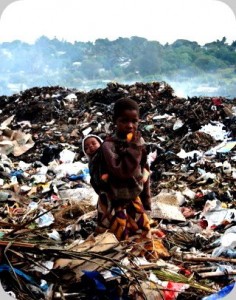Now that I am the project coordinator of the Accessible Icon Project, I am able to make fun social media pieces like this below to help spread the message that all people are people of ability. 
Category Archives: Uncategorized
Mozambique: The Bocaria
I have seen the poor part of Africa–the part of Africa that is highlighted in documentaries, books, and television segments. It is the part of the world some people do not believe is real and cannot fathom even existing. It is the place where people of all ages literally search through piles and piles of trash to find food and materials for the day. It is where 11 year old children do not go to school, but instead dig through trash to find items they can sell and eat.
Today I went to the Bocaria—the local garbage dump and home to hundreds of children, parents, and elderly people in Maputo, Mozambique.
Our day…
We woke up early and met a group of people at the Arco Iris center in Zimpeto, Mozambique. From there, we left on a small white bus and took a 15 minute bus ride to the Bocaria. From the bus window, I saw little stands where people were selling fruits, vegetables, and other small items. We also passed cement houses with tin roofs stationed close to the roadside. Cars were flying by us and people of all ages were running through the streets. It is not uncommon to see little children–2 and 3–playing close to the road as well as 6 and 7 year old children caring for their younger siblings. Many carry food on their heads and babies on their backs using a capulana. Some people smiled, some waved, and others just stared as we passed.
After traveling on top of a bumpy dirt road with many little hills and curves, we finally pull into the Bocaria. The first thing you notice are the mountains and mountains of trash and the smell of fire smoke and sweat. There is so much garbage that fumes rise from the mountains because the trash is being burned. Piles of garbage is to our left, homes on our right, and children of all ages standing in front to greet us.
As soon as we get off the bus, little children are waiting for hugs and embraces. These children have mixed matched clothes with holes and dirt, smiles, and usually runny noses. You pray for grace and love, and embrace the children who are excited to see you. As you are being led by the children to the church you are visiting, you start to notice the broken glass and metal you are stepping over. You have sneakers so you are fine, but then you notice the little boy who is holding you hand is not wearing shoes. Many children are not wearing shoes. Although you try to watch your step, you cannot avoid the broken glass and metal. We walked over to a church 50 ft from the dump.
The church service was amazing. People were dancing and singing. Children were clinging on to me and playing with my curly hair. I was brought to tears at how amazing this place was. Despite the external “ugliness”, much beauty was present in the people and in this building. After the service was over, it is tradition for Iris Ministries to hand out one piece of bread to each child at the door. As the children were pushing and shoving their way up to the front, I was praying we would have enough bread to feed all these hungry children, but we ran out. We ran out of bread. A good 20-30 children were without bread. And you know what, not one child screamed, cried, or even pouted. It is what it is. That is the motto I would say rings true in places like this. Some children received bread, and others did not. They seemed more used to this unfairness than I did.
There are some memories at the Bocaria that I hope to write more in detail about at another time. I decided to briefly include the stories below:
1. The smile of the little boy who received pink socks
2. The sadness of Erika, an 11 year old girl searching through the rubbles of garbage with her mother
3. The “all about me” shirt that was donated and handed out to one of the children
4. Being on top to the garbage dump and watching people rush over to the new pile dropped off by a garbage dump
Until next time,
Leah

